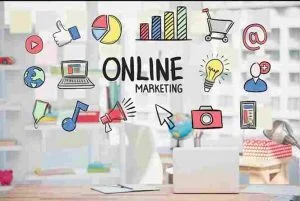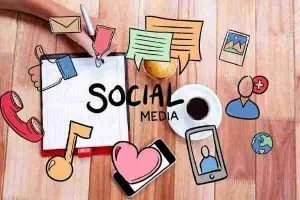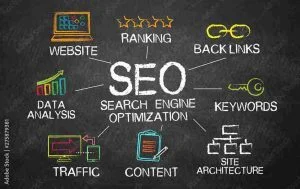We all have come across the term “Digital marketing” at least once in our lives, haven’t we? But how many times have we tried to understand it’s true meaning?
We all have different notions about it, most of which are merely backed by knowledge!
Because of this new discussion about the usage of term “digital marketing”, we thought it could be important to pin down precisely what the term “Digitalization” means.
Digitalization is the use of digital technologies to change a business model and provide new revenue and value-producing opportunities.
And digital marketing is the process of using technology and other tools to achieve desired results.
In this post, I will take you through everything about digital marketing from scratch. And as you go through the blog, you will find some quick facts after every topic that will certainly blow your mind!
Starting with the basics first,
What exactly is “Digital Marketing”?

Digital marketing, often known as online marketing, is the promotion of companies via the use of the internet and other types of digital communication to interact with potential clients. Not only does this encompass email, social media, and web-based advertising, but it also includes text and multimedia messaging as a marketing channel!
It refers to the process of creating or delivering a product or service. It is not just about creating or selling products but also about building relationships with consumers and making the most out of them.
According to HubSpot Research, 77% of customers do internet research on a business before connecting with it. Meanwhile, 51% of shoppers say they use Google to do product research before purchasing.
Modern digital marketing consists of a complex network of channels, including:
Content marketing.
Website marketing.
PPC (pay per click) advertising.
SEO (search engine optimization)
Quick fact: Traditional advertising spending is expected to increase by 0.55% in the next 12 months while digital marketing spending is projected to increase by 13.59%
Why Digital marketing?
Marketing is powerful, and there were already different methods of marketing that existed from a really long time. Then why did we need digital marketing? What is the reason that 60% of marketers across various industries have already shifted their efforts towards digital marketing?
Well the answer to this is simple, every day a large portion of the world’s population spends substantial time on digital platforms. Businesses have been increasingly conscious of this reality over the last decade and have committed to exploiting these platforms to market their goods and services. Because marketing is about engaging with clients in the right location at the right time, you need to be online!
Apart from that , digital marketing has several other benefits such as lower cost, flexibility, easily shareable, global reach, easy segmentation, precise targeting etc!
Quick fact : 90% of businesses said that social media was their primary or secondary channel for promoting content!
What are the types of Digital marketing?
There are various types of digital marketing, some of them are mentioned below:
Search engine marketing:

Search engine marketing is all about putting your website to the top of the search results when someone searches for your brand, products and services, and other relevant words and phrases. Consider Google (the obvious choice), but also Bing (which is ideal for B2B!). It encompasses both organic or natural search (search engine optimization, or SEO) and sponsored search (pay per click, or PPC), as well as desktop and mobiles.
Display advertising:

Display advertising, often known as banners, is similar to conventional print advertisements found in magazines, only it is done online and you may target particular publications that you know your target demographic reads. With programmatic advertising (where advertisements are booked, evaluated, and optimized automatically using algorithms) and retargeting, it has grown considerably more complex. However, the difficulty with display advertising is that it is difficult to track the outcomes because conversion rates and factors influencing sales cannot be tracked.
Mobile marketing:

Given how much time your consumers spend on their phones, mobile marketing must be a fundamental component of your digital marketing plan.
Mobile marketing is nearly as wide as digital marketing and will intersect with many other sorts. It entails performing everything you do on desktop but adapting it for mobile, as well as mobile-specific activities like in-app advertising, text messaging, and using social messaging applications. It’s especially vital if you’re aiming for a younger demographic who spends all of their time on their phones.
Video marketing:

Video is the star of the show these days, and if there’s one thing you should be doing, whatever your business, this is definitely it! It might be a brief clip or a lengthier format, instructional or amusing, pre-recorded or live and in real time. It is no longer enough to just take a TV commercial and post it online; you must also create specific content for your digital platforms.
Content marketing:

Instead of just broadcasting an advertising message, content marketing entails developing and sharing material—text, images, and multimedia—that offers value to your audience. If you’re in B2C (business to consumer), ‘content’ can include social media postings, blog articles, and entertaining videos; if you’re in B2B (business to business), it could include white papers or reports, webinars, and informative educational videos.
Social media marketing:

In comparison to conventional mediums like as television, print, and even online display advertising, social media brings a whole new level of engagement and involvement. Instead of simply broadcasting messages to a large number of people, you can interact with them and listen to what they have to say. There are several platforms available, including Facebook, Instagram, Twitter, LinkedIn, Pinterest, YouTube, and Snapchat, with possibilities ranging from organic (such as Facebook groups, page updates, stories, and Messenger) to sponsored (such as Facebook advertisements). Almost every business should be present on at least a handful of these social networks.
Email marketing:

In a world when everyone is instant messaging or Snapchatting, email marketing may appear archaic, yet it is still one of the most successful digital marketing methods. E-commerce sites and retail brands, in particular, are seeing a lot of success with pushing seasonal promotions and discounts (think Black Friday deals or Mother’s Day), while email newsletters can also be used to ‘nurture’ your prospects by providing a lot of value beyond just pushing your products and services.
Influencer marketing:

Influencer marketing entails collaborating with influencers (celebrities, experts, and authority figures) who already have a following. When they advertise your goods to their audience, frequently on sites like Instagram, Snapchat, or YouTube, their committed followers will take their advice and buy from you. You would imagine the Kardashians or some uber-cool young starlet promoting your product to individual customers, but influencers can also be helpful for B2B.
Quick fact: 56% of customers find print marketing to be the most most trust worthy type of marketing.
What is SEO in digital Marketing?

SEO (search engine optimization) is an acronym for “search engine optimization.” It is the process of improving your website so that it displays more prominently when people search for things or services related to your business.
On-page SEO and off-page SEO are two equally significant approaches!
On-page SEO refers to the practice of producing content to improve your rankings. This entails, among other things, including keywords into your pages and content, consistently producing high-quality content, and ensuring that your metatags and titles are keyword-rich and well-written.
“Off-page SEO” (also referred to as “off-site SEO”) refers to activities done outside the website to improve it’s ranking on the search result pages.
Quick Fact: The close rate of SEO B2B marketing is almost 8 times higher than that of traditional marketing.
What are the skills required to become a Digital marketing?
SEO and SEM
Google’s algorithm is continually evolving, and the value of using relevant and specialized keywords has risen dramatically. As a result, Search Engine Optimization (SEO) has emerged as a critical talent that every digital marketer must possess in order to support all levels of digital marketing. The more technically-oriented members of the team can manage the technical aspects of SEO; nevertheless, having a good understanding of the dynamics of SEO, as well as knowing how to optimize all types of content, is essential for conducting a successful digital marketing campaign. Both SEO and SEM assist you in not only pushing your content to the target audience but also in narrowing down your customer database.
Social intelligence
Do you want to be a manager? Begin with social intelligence. Do you want to collaborate more effectively with different contractors? Begin with social intelligence.
When you realize how little you vary from other people, you’ll begin to speak their language and collaborate more effectively—without hating your workplace.
Data Analysis
Data analytics is the use of functional methods and current software to collect and process a wide range of information from your target market’s various online activities. These online interactions might include material viewed, online purchases, search searches, and other relevant traces to your business. With a plethora of online tools now accessible to monitor data across many platforms, marketers may more easily analyse and make appropriate marketing decisions. Marketers must comprehend the notion of data cleansing, which is the act of removing inaccurate, duplicated, or incomplete data from a database. To make successful judgments, it is advised that the database be regularly updated and that undesirable data be removed.
Basic design Skills
While larger teams may have a dedicated art department staffed with skilled Graphic Designers, it is often the Digital Marketer’s responsibility to perform day-to-day tasks such as selecting and modifying images for the company’s social media feeds or preparing the layout for an email newsletter. A solid understanding of basic design principles, such as how to organize information for readability, is a big benefit in this position. This is frequently preceded by an intuitive grasp of the customer’s experience.
Whatever you’re trying to accomplish as a Digital Marketer, your competitors are likely trying to achieve the same thing. Your edge lies in your ability to innovate and out-think them—not to mention find creative solutions to all the other challenges that come up over the course of a day, from discovering novel pathways to your users to devising new ways to grab and hold their attention.
Quick fact: 64% of consumers say watching a marketing video on Facebook has influenced their their purchase decision in the last month.
What are some job roles that Digital marketing Industry has to offer?
Digital Marketer – A knowledgeable, jack-of-all-trades type marketer who can manage social, content, webinars, and paid advertisements, especially in smaller organizations.
Digital Marketing Strategist – As above, but with a greater emphasis on decision-making and measurement.
Marketing Assistant – A person in this role may assist with everything from backlinking outreach to social media participation to press pitches.
Graphic designer – A graphic designer is someone who creates ad visuals, social media graphics, blog infographics, and so on. Also aids in maintaining brand consistency, especially if there is no Brand Manager on the team.
Copywriters – Copywriters create website copy, emails, advertisements, and even content such as e-books and blog entries. They may also be able to assist you strategize what has to be written, especially if they are experienced.
Quick fact: 79% households say they read or scan direct mail ads
How can you learn digital marketing ?
There are numerous courses available on the internet that allow you to master digital marketing from the ground up for free! Some of the courses include:
- Fundamentals of Digital Marketing by Google Digital Garage.
- SEO by Usman Latif (Digiskills).
- Inbound Marketing Course by Hubspot Academy.
- Facebook Blueprint Course by Facebook.
- Google Ads Course by Google.
- Social Media Marketing Course by E-Marketing Institute.
Below are some tools that you can use as a digital marketer:
- Canva – Free graphic designing tool.
- Keyword Planner by Google – Free Keyword Research tool.
- SEMRush – Free all in one SEO and PPC tool.
- Quillbot – Free Paraphrasing tool.
- Grammarly – Free Grammar Checker.
So, if you are someone who is planning to start a career in digital marketing, or are simply looking out to learn a new skill, now is the perfect time to begin!